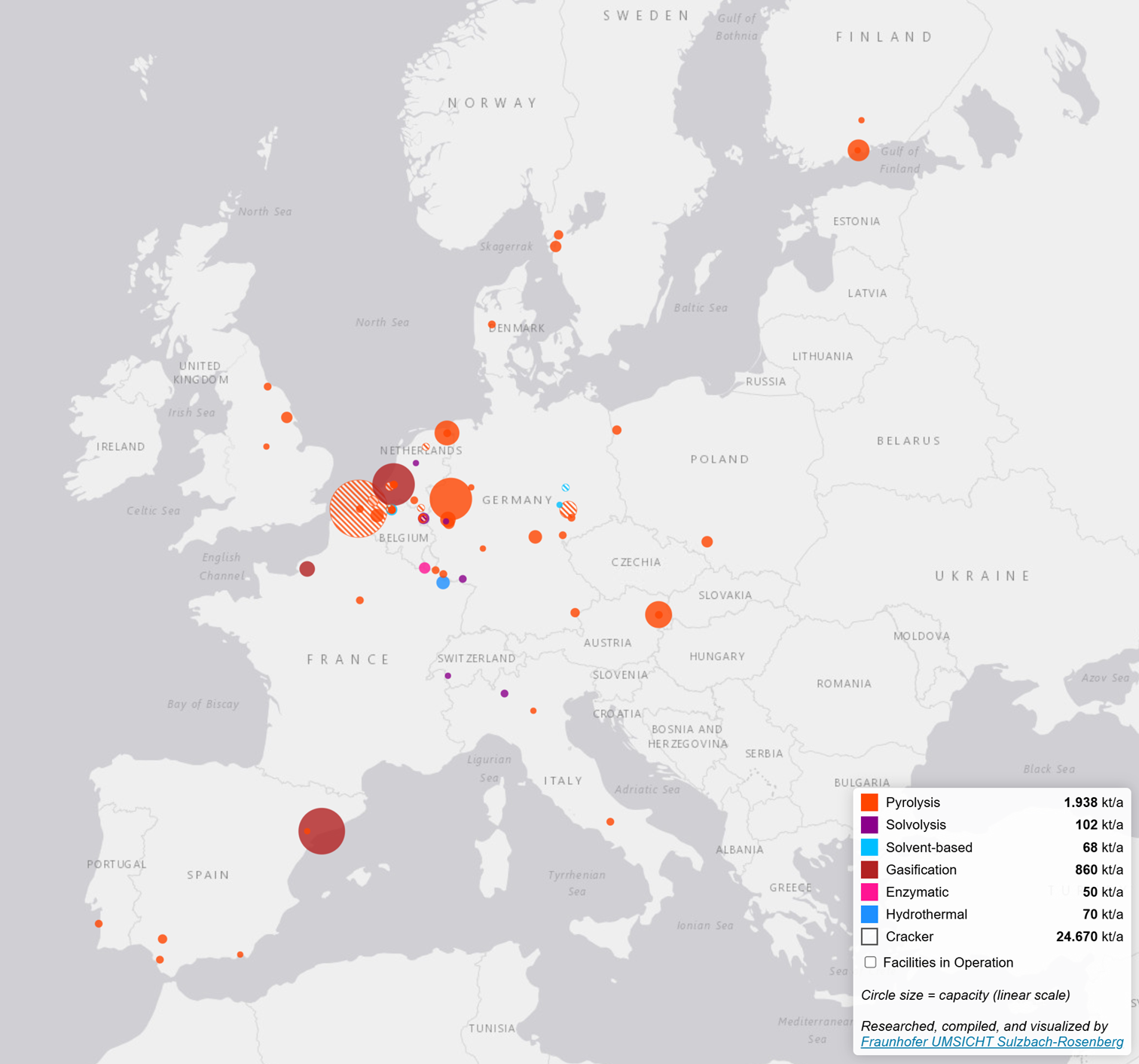Mapping Chemical Recycling in Europe: Projects, Capacities and Status
60+ Chemical Recycling projects - 18 plants operational
Interactive map by Fraunhofer shows 2.8 Mt/a planned capacity but only 0.29 Mt/a operational. Pyrolysis dominates the project pipeline (1.68 Mt/a planned), while larger gasification plants remain unbuilt. Three solvent-based/solvolysis plants deliver 27 kt/a in operation.
Sulzbach-Rosenberg (Germany), October 2025 - Chemical (advanced) recycling can extend circularity to plastic streams that are hard to recycle mechanically. The Fraunhofer Institute for Environmental, Safety, and Energy Technology UMSICHT has compiled an interactive map of Europe's chemical recycling activities, covering facilities, technologies, capacities, and project status across the continent. For context, the European steam cracker sites and capacities are also listed.
Directly access the interactive map here: https://s.fhg.de/crmap
Key findings (as of October 2025)
- Scope: 65 projects in the pipeline across Europe.
- Planned chemical recycling capacity (excluding cancelled and operational projects): 2,799 kt/a.
- Operational today: 18 plants totalling 289 kt/a (Pyrolysis 262 kt/a; Solvolysis 19 kt/a; Solvent-based 8 kt/a). No gasification plants are operational.
- Technology mix of planned and operational capacities: Pyrolysis 1,938 kt/a; Gasification 860 kt/a; Solvent-based 68 kt/a; Solvolysis 102 kt/a; Enzymatic 50 kt/a; Hydrothermal 70 kt/a.
- Discontinued projects: 9 chemical-recycling projects (819 kt/a) have been officially cancelled, including 7 pyrolysis projects totalling 791 kt/a.
Expert perspective from Prof. Matthias Franke
»EU-level regulation on chemical recycling remains unsettled, and national implementation is pending. Meanwhile, lower fossil feedstock prices, high energy costs, and imports of low-cost recycled materials from Asia pose a challenge to the price competitiveness of European recycling - both mechanical and chemical. Together, these factors create uncertainty for investors. Moreover, many advanced recycling technologies continue to face challenges with operational stability, yields, and product quality. Nevertheless, Europe remains a leader in innovation in plastic waste management, as reflected in patent filings - even as China, South Korea, and Japan have been catching up,« says Prof. Matthias Franke, Director of the Sulzbach-Rosenberg branch of Fraunhofer UMSICHT.
Methodology and scope
- Coverage: Chemical/advanced recycling projects in Europe (pyrolysis, gasification, solvolysis, solvent-based, enzymatic, hydrothermal). Tire pyrolysis is included. European steam crackers are mapped as a separate overlay for system context.
- Capacities: Nameplate capacities reported by companies or public sources; rounding may occur.
- Last update: October 2025. The dataset is maintained and updated periodically by Fraunhofer UMSICHT (Sulzbach-Rosenberg).
About Fraunhofer UMSICHT
The Fraunhofer Institute for Environmental, Safety and Energy Technology UMSICHT develops technologies, products, and services that conserve resources and strengthen the competitiveness of the economy.
The Sulzbach-Rosenberg branch focuses on chemical recycling process development, pilot and demonstration scale testing, system assessments and downstream processing.
Last modified:

